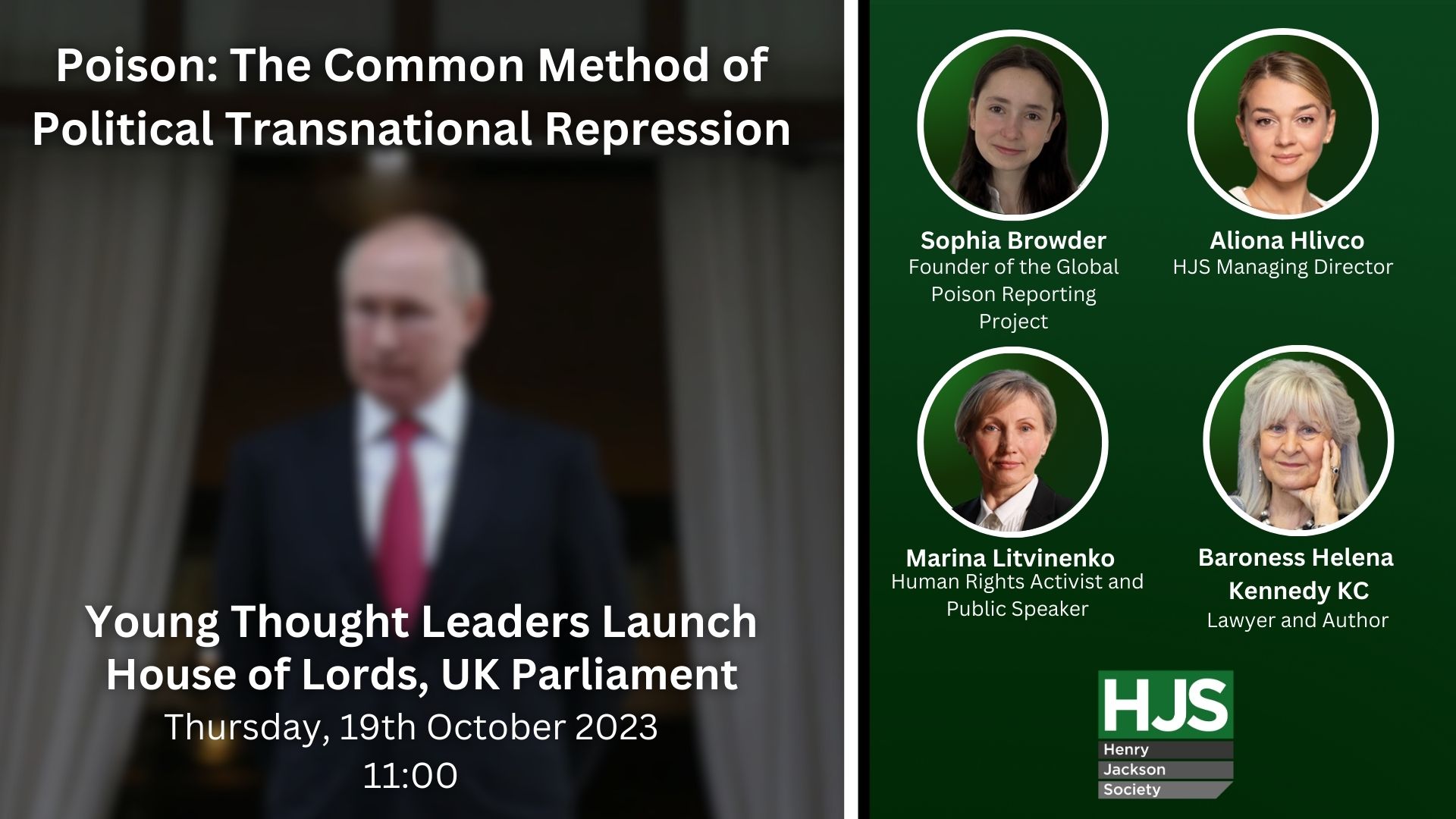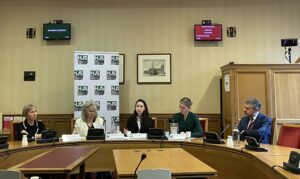Poison: The Common Method of Political Transnational Repression

- This event has passed.
Poison: The Common Method of Political Transnational Repression
19th October 2023 @ 11:00 am - 12:00 pm

The poisonings of Alexander Litvinenko and Sergei and Yulia Skripal shocked Britain and the world. New analysis shows that they were not isolated cases, but part of a rising trend, with critics of the Kremlin among the most affected. To save lives and prevent wider contamination risks, policymakers, dissidents and healthcare professionals need to take this threat more seriously and prepare for future cases. Nor is Russia the only likely miscreant in this regard.
To mark the launch of its new Young Thought Leaders Programme, The Henry Jackson Society is delighted to launch a paper by Sophia Browder, a young student who has conducted a wide-ranging analysis of the rising levels of political criminal poisonings in recent years.
In the face of this growing threat, Sophia’s comprehensive paper offers a valuable resource to policymakers, with recommendations on how both dissidents and health systems can manage the dangers. To discuss her findings, she is joined by an expert panel, chaired by Baroness Kennedy, with speakers including Maria Litvinenko, wife of Alexander.

Sophia Browder is a human rights activist, founder of the Global Poison Reporting Project, and an A Level student at St Paul’s Girls’ School in London. She was a scholar at the CEE Research Science Institute program at MIT. Sophia is also a founder of Chiron’s Corner, an online STEM platform. Sophia created a website, freekara-murza.org, to support the campaign for Vladimir Kara-Murza’s release from Russian prison. She is the chief-editor of the iPaulina, a school webzine, and a Gold Award recipient in the Cambridge Chemistry Challenge.

Aliona Hlivco is the Managing Director of The Henry Jackson Society, and a political analyst and foreign policy expert with a background in domestic and international strategic communications, global affairs and geopolitics. She started her career in Ukrainian politics, holding several government positions in the Ministry of Infrastructure and Regional Parliament in Ukraine, focusing on international partnerships, cross-border cooperation, infrastructure, public-private partnerships and decentralisation. She ran eight national and local election campaigns, and coordinated strategy during the 2013-2014 Revolution of Dignity.
She finished her time in Ukrainian politics as an elected member of the regional parliament in 2015-2018 and a chief adviser to the Chairman of Regional Government.
Aliona contributes regularly to the BBC, Al Jazeera, Deutsche Welle, The Telegraph, Monocle, CapX and is a guest lecturer at various academic institutions (Harvard University, Cambridge University, Middlebury Institute of International Studies, NYU, London Business School, London UOTC, King’s College London etc) to provide her expertise on Ukraine and global affairs. She is fluent in English, Ukrainian and Russian, with an intermediate level in German.
She is a recipient of the Order of Merit for her outstanding service and invaluable contribution to the support of democracy in Ukraine during the Revolution of Dignity 2013-2014.
Aliona holds MA in Political Science and MPA from Chernivtsi National University in Ukraine.

Marina Litvinenko is a public speaker and a campaigner for justice. Following the murder of her husband, Alexander Litvinenko, in November 2006, Marina began a decade long fight to get at the truth behind his assassination which resulted in the publication of a comprehensive public inquiry report in January 2016. Through this tragedy she found her own compelling voice, one that speaks with strength and conviction. Appearing in newspapers, magazines and on television screens, Marina has appealed to the public to heed the warning of her husband’s death. In her own way, she uses her public platform to continue what her husband started.
In 2007, she co-authored ‘Death of a Dissident: The Poisoning of Alexander Litvinenko and the Return of the KGB’ with Alex Goldfarb. In 2011 the two also published an updated version in Russian, ‘Sasha, Volodya, Boris: The Story of a Murder’. She attends and speaks at international seminars and conferences in the UK and abroad, participates in roundtable discussions and is involved in human rights causes.

Baroness Helena Kennedy KC is one of Britain’s most distinguished lawyers. She has spent her professional life giving voice to those who have least power within the system, championing civil liberties and promoting human rights. She has conducted many prominent cases of terrorism, official secrets and homicide. She is the founding force behind the establishment of the Bonavero Institute of Human Rights at the University of Oxford. In 1997, she was elevated to the House of Lords where she is a Labour peer. She has published a number of books including two on how the justice system is failing women, and has written and broadcasted on many issues over the years. Currently, she has taken on the role of Director to the International Bar Association’s Human Rights Institute. She directs the Institute’s work upholding the rule of law and human rights globally.
***
EVENT SUMMARY

The Henry Jackson Society was pleased to host Sophia Browder, Marina Litvinenko and Baroness Helena Kennedy KC for a talk aimed at shedding light on poison being increasingly used as a political tool of repression. To save lives and prevent wider contamination risks, policymakers, dissidents and healthcare professionals were alerted of the need to take the threat more seriously and prepare for future cases. Sophia first flagged the issue of poisoning as political murder following the incidents of Alexander Litvenenko and Yulia Skripal, and in her research, found limited information that distinguished regular poisoning cases from political ones. Sophia spoke about the intensity, treatment and response of the cases where lethal amounts of poison are administered to those who oppose oppressive regimes, like in Russia. She highlighted that the nature of poison used goes untraced by the victim until it is too late and that hospitals should be well equipped to ‘treat the toxin’ and not the symptom, as these lethal doses are administered with great precision. The contagious properties of the poisons used also pose a public safety threat. These covert methods of eliminating dissent reduce the traceability and accountability of the oppressive states to the murders of the political ‘enemies’. Some of the key recommendations she made were to introduce health cards for dissidents of hostile regimes, to limit global position transportation by improving tracking and detention systems at borders, to authorise complete decontamination to reduce the harmful effects of the poison and prevent mass incidents and to maximise media attention as being important for those under threat of political criminal poisoning.
RELATED EVENTS
The Dangers of US Isolationism
In contrast to Western democracies that seek economic growth and peaceful coexistence, a new set of autocrats has emerged, each with their respective territorial ambitions. Three of the most notable powers … Continued
How Mongolia is Transforming into a Beacon for Foreign Direct Investment in East Asia
Lord David Cameron’s April 2024 visit to Mongolia and Central Asia demonstrates the growing importance that London places on protecting and promoting British interests in the Indo-Pacific region. A new report … Continued




